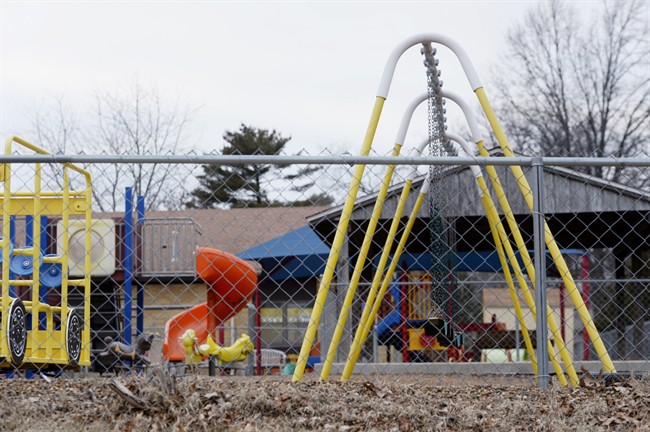When it comes to child welfare, all of Saskatchewan’s political parties agree: the current system isn’t good enough.

It’s a system that’s taking a growing number of children into care. In 2019, there were 3,412 kids in the province’s care — an 11-year high, according to Saskatchewan’s Ministry of Social Services.
New data obtained by Global News shows the number of children in care has since expanded to 3,584 as of Sept. 30. Nearly 83 per cent, or 2,964, of those children are Indigenous, the ministry said.
Saskatchewan Party Leader Scott Moe said if re-elected on Oct. 26, his government would continue to support the implementation of federal legislation that allows First Nations to create their own child welfare systems.
“This is an area where we need to do better, not just as government, but as society,” Moe said at a campaign event on Sept. 30.
The Saskatchewan Party government recruited Indigenous foster families, worked to keep siblings together and provided cultural training to caseworkers, a spokesperson said in a statement.
“Our priority remains the safety and security of children and ensuring that no children fall through the cracks,” the statement reads.
NDP flags high caseloads
- As Carney heads to India, Canada seeks to revoke citizenship of 2008 Mumbai attack ‘mastermind’
- What to know if you’re stuck or have an upcoming flight to Puerto Vallarta
- What’s a Canadian firm under defence industrial strategy? It’s complicated
- Kendamil baby formula sold at Costco recalled due to toxin concerns
For the Saskatchewan NDP, the need to “do better” is an understatement. In its platform, the party says it wants to work with First Nations to reform the child welfare system.
Prince Albert Northcote NDP candidate Nicole Rancourt said she’s concerned about the elevated number of child deaths reported to the social services ministry.
From Jan. 1 to Sept. 30, the ministry recorded 31 deaths. Seven of the children who died were in care, while 24 had received services from the ministry within the past 12 months.
All but one of the children who died in 2020 were Indigenous.
“One death is way too many,” said Rancourt, a former social worker.
The number of fatalities in the first nine months of the year nears 2019’s total of 34 deaths — already up from an average of 21 deaths over the last five years, according to the children’s advocate.

Get breaking National news
Rancourt said the province needs to hire more caseworkers to better address the complex needs of children involved with social services.
“Because of their high caseloads, they’re unable to meet with families as often as they would like to,” Rancourt said.
“Some kids and families are falling through the cracks.”
FSIN calls for end to birth alerts
Federation of Sovereign Indigenous Nations vice-chief David Pratt said whatever party is elected must end birth alerts. The alerts notify hospitals of expectant mothers considered to be high-risk.
“We want to make sure that our mothers are able to have access to their children when their babies are being born,” Pratt said.
The Saskatchewan Party has not committed to ending the practice, though it is under review.
“The removal of children from a home is only used as a last resort when a child’s safety is at risk,” the Sask Party said in a statement.
“We will continue working with community partners to keep vulnerable moms and their babies together safely.”
An NDP government would strive to phase out birth alerts, Rancourt said, but would not place an immediate ban on the practice.
“We want to put more money into the hands of community-based organizations, so they can provide this really valuable service (to mothers), so that we don’t ever need to have birth alerts again,” she said.
Other parties weigh in
Pratt said more needs to be done to reduce child poverty in Saskatchewan.
The NDP committed $5 million in its platform for developing an anti-poverty strategy.
The Saskatchewan Green, Liberal, Progressive Conservative and Buffalo parties flagged poverty as one of the primary issues that put children at risk, along with addictions and mental illness.
“It seems like the Saskatchewan Party sees lower-income and Indigenous families as somewhat expendable,” said Robert Rudachyk, interim leader of the Saskatchewan Liberal Party.
“We’ve got lots of money for the oil companies, but not enough for our kids. What does that say about the Sask Party’s priorities?”
Rudachyk said more money needs to be spent on addictions and mental health, though his party has not identified how much money its members think is needed.
Meanwhile, Saskatchewan’s Green Party wants to introduce a guaranteed livable income, in-school dental care and public coverage for mental health care.
“I, for one, really want to see that our province has the most progressive policies put forward and that we are in a situation where we don’t see children growing up traumatized and in such high levels of care,” said party leader Naomi Hunter.
Saskatchewan PC Leader Ken Grey said his party wouldn’t outsource work to other provinces, making well-paying jobs more accessible.
The party would also commit $50 million in additional funding for mental health services, he said.
“We need to direct and target that funding to where it’s absolutely necessary, and that’s front-line workers,” Grey said.
The Buffalo Party said Saskatchewan must address its “economic opportunity deficit” to better protect children and families.
“Waiting for children to be in danger to react to family crisis is chasing our tail,” Cut Knife-Turtleford Buffalo candidate Richard Nelson said in a statement.
“We must predict, plan and react to economic, health or other stresses on individuals and families.”







Comments
Want to discuss? Please read our Commenting Policy first.